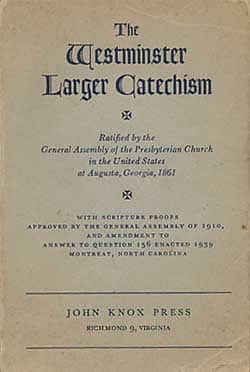 This Day in Presbyterian History:
This Day in Presbyterian History:
Waiting Upon God When You Take Communion
It was back on November 14 that the duties prior to the serving of Communion were laid down for our readers in Larger Catechism 171. Now we arrive at the duties of Communion while the Supper is being served, taken from Larger Catechism 174.
This catechism asks and answers “What is required of them that receive the sacrament of the Lord’s Supper in the time of the administration of it? Answer: “It is required of them that receive the sacrament of the Lord’s Supper, that, during the time of the administration of it, with all holy reverence and attention they wait unto God in that ordinance, diligently observe the sacramental elements and actions, heedfully discern the Lord’s body, and affectionately meditate on his death and sufferings, and thereby stir themselves to a vigorous exercise of their graces; in judging themselves, and sorrowing for sin; in earnest hungering and thirsting after Christ, feeding on him by faith, receiving of his fulness, trusting in his merits, rejoicing in his love, giving thanks for his grace; in renewing of their covenant with God, and love to all the saints.”
We are, as our title puts it, “to wait unto God with all holy reverence and attention.” In one sense, this is to be our attitude and action with respect to the worship service itself. This writer could speak and write volumes about some people who do anything and everything but worship the Lord during the church. Generally speaking, American Christians have lost the sacredness of worshiping the holy God. But this reverent and attentive waiting upon God should especially be true of us during this ordinance which particularly takes us back to our Savior’s atonement on our behalf. An undivided focus is absolutely necessary, especially if we follow the requirements enunciated in this catechetical answer.
First, we are to “diligently to observe the sacramental elements and actions.” Outwardly, those elements are “bread and wine,” but spiritually, they are our Lord’s body and blood. Do we “discern the Lord’s body?” in this sense, or do we just see them as bread and juice? Obviously, there is required some doctrinal knowledge of this sacrament, and a historical understanding of what took place at the first observance of the sacrament. An earnest listening to the reading of 1 Corinthians 11:23 – 34 is called for by the participant.
The sacramental “actions” are also to be observed closely. There is so much ignorance of this in our congregations. First, the Savior took the elements from the table. This signifies Christ taking a human nature (body and soul) unto Himself when He was born in Bethlehem. Then, Jesus put His blessing on the elements, giving thanks for them, and setting them apart from their ordinary usage to a special religion usage. Our Savior Himself was set apart for His special work as the Redeemer of God’s elect. Next, He broke the bread, an action signifying His body broken on the cross for us. Fourth, He gave the elements to the apostles, signifying the gift of Christ to sinners by God’s infinite grace. The next action was by the communicants, as they received the elements, as sinners receive Christ as Savior by grace alone through faith alone. And last, communicants eat the bread and juice, signifying our dependence on Christ for spiritual life and growth. All these are the needed observation of the sacramental actions, which you and I must observe.
The rest of the answer speaks of our spiritual attitudes and actions at the communion table. We are to judge ourselves, sorrowing for our sins. There must be an intense desire for fellowship with our Savior. What about an attitude of dependence upon Him, not just in our salvation, but also in our sanctification? All this is found in “feeding on him by faith, receiving of his fulness, trusting in her merits, rejoicing in his love, giving thanks for his grace.” And last, but not least, the true nature of the sacrament, which is a military term speaking of loyalty and obedience and faithfulness to our commander, is necessary. To the captain of our salvation, we renew our covenant to belong to Him, and mutual love to our brothers and sisters in Christ.
Words to live by: The next time you observe the Lord’s Supper in your congregation, take this catechism either with you, or remember its attitudes and actions. It is your duty during the administration the occasion of the Lord’s Supper. Let it be then a revival of your soul in your renewed love for the Lord Jesus Christ, who loved you and gave Himself for you.
Through the Scriptures: 2 Corinthians 4 – 6
Through the Standards: Manner of partaking the Lord’s Supper.
WLC 170 — “How do they that worthily communicate in the Lord’s Supper feed upon the body and blood of Christ therein?
A. As the body and blood of Christ are not corporally or carnally present in, with, and under the bread and wine in the Lord’s supper, and yet are spiritually present to the faith of the receiver, no less truly and really than the elements are to their outward senses; so they that worthily communicate in the sacrament of the Lord’s supper, do therein feed upon the body and blood of Christ, not after a corporal and carnal, but in a spiritual manner; yet truly and really, while by faith they receive and apply themselves Christ crucified, and all the benefits of his death.”
